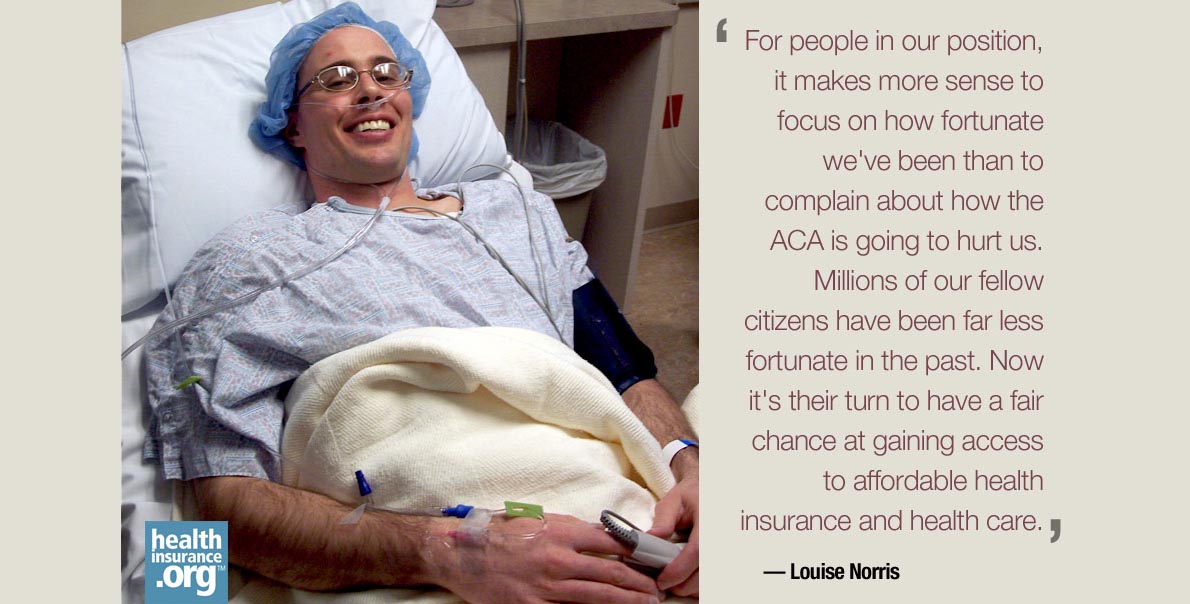
Although the ACA will directly impact millions of Americans in a beneficial way, there are some people who will end up paying more for their health insurance in 2014. That's the case for our family, and yet we're still strong supporters of health care reform and the ACA.
We've had individual health insurance since 2002, and have always opted for a high deductible. The only time we've used our health insurance for more than preventive care was when my husband (pictured above) needed knee surgery in 2008. So our high-deductible gamble has certainly paid off. We've minimized the premiums we pay, while still maintaining a safety net in case of an unexpected catastrophic medical bill.
We currently have a policy with an individual out-of-pocket exposure of $7,500 ($15,000 for the family). Under the ACA, the maximum out-of-pocket is $6,350 for an individual and $12,700 for a family, so our plan is not ACA-compliant. We're opting to keep it until it renews in late 2014, but at that point we'll have to switch to a new plan.
We will not qualify for any premium or cost-sharing subsidies. In our region of Colorado, a Bronze PPO plan for our family of four is going to be in the range of $750-$1,100 a month. We currently pay $450 a month for our family's policy.
(There are some Kaiser HMO plans available that are less expensive, with rates that start in the mid $500s. However, we would have to leave our beloved family doctor – who works with all of the major PPO networks – and switch to the one Kaiser facility in our area instead. Given that our premiums would still increase by at least $100/month, this is not a good option for us in 2014. We'll reconsider when our policy renews at the end of 2014. If Kaiser is still a significant outlier in the premium comparisons at that point, we'll consider switching to an HMO.)
A large portion of people who buy individual health insurance will see an improvement in their situation in 2014. About half will qualify for subsidies. Anyone who currently has a policy with pre-existing condition exclusions or rate-ups based on medical underwriting will probably benefit from getting a new policy with no medical underwriting. And people who currently opt for low-deductible individual plans will likely find lots of options that are similar in price to what they already purchase.
But a relatively small portion of the people who buy individual health insurance are going to see significant rate increases, especially those who meet all of these criteria:
- Currently have plans with out-of-pocket exposure that exceeds ACA limits;
- Currently qualify for medically underwritten plans with no pre-existing condition exclusions or rate-ups;
- Don't qualify for ACA subsidies.
Our family falls into all three categories, and there is no way around the fact that our coverage is going to be significantly more expensive once our plan renews in 2014.
Why we support the health reform law
And yet we support the health care reform law. We support it because something like this isn't supposed to be all about us. In the case of healthcare reform, our higher premiums will help ensure that our friends and neighbors and fellow citizens have access to affordable health insurance.
We've had hundreds of clients over the years who are unable to get anything other than high-risk pool coverage because of pre-existing conditions. They will now have all the same options as everyone else, and will no longer have to worry about hitting the lifetime or annual benefit maximums on their policies. We've had low-income clients who choose high-deductible plans because it's all they can afford, but have no realistic way of covering the deductible if they do need to use the plan. Now they'll have access to premium and cost-sharing subsidies that will make better quality coverage much more affordable.
We know we're very lucky. We're lucky that our family is healthy. We're lucky that our income is high enough that we don't qualify for subsidies. We're lucky that we've always been able to pick any health plan we wanted, without worries of being declined because of pre-existing conditions.
Not everyone is that lucky. For people in our position, it makes more sense to focus on how fortunate we've been than to complain about how the ACA is going to hurt us. Millions of our fellow citizens have been far less fortunate in the past. Now it's their turn to have a fair chance at gaining access to affordable health insurance and health care. The people who need the most financial assistance will get it in the form of premium and cost-sharing subsidies.
Many of us who don't qualify for subsidies are far from wealthy. But we've got the basic necessities of life covered. If your household income is above 400 percent of poverty, you're not struggling to put food on the table and maintain basic housing for your family. It's time to focus on the ways that the ACA will help all of the people who haven't had realistic access to health care in the past. And to remind ourselves that we're all in this together.


